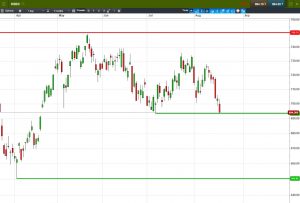This report is not a personal recommendation and does not take into account your personal circumstances or appetite for risk.
 “Contagion” seems to be the word of the week for many UK Index investors, as fears over Turkey and its impact on financial markets are driving the benchmark index lower. But what is contagion and why is it relevant to retail investors? Let’s investigate.
“Contagion” seems to be the word of the week for many UK Index investors, as fears over Turkey and its impact on financial markets are driving the benchmark index lower. But what is contagion and why is it relevant to retail investors? Let’s investigate.
At its basic level, financial contagion is like read-across, but on a much broader scale. My colleague Mike wrote about read-across several weeks ago, so go ahead and give his piece a read if you want to know more details.
Financial markets and global economy are closely interlinked. Just like one company can influence its direct competitors, negative macroeconomic events in one country can “infect” and spread to other markets.
In a globalised world, investments know no borders. When US Federal Reserve raises interest rates, this makes investments in emerging markets like Turkey less attractive. Suddenly, Turkish banks are having troubles with liquidity and are finding it more difficult to secure overseas capital.
That’s bad for Turkish economy, but can also impact European banks like UniCredit, BNP Paribas and BBVA that hold large stakes in Turkish banks (UniCredit owns 40% of Yapi Kredi, Turkey’s 4th largest bank, and generates 2% of group revenues from Turkey). And if European banks are suffering, there is a high likelihood that big UK banks will also suffer from the read-across effect.
In this way, financial contagion is like a brushfire. It starts as a single spark somewhere half-way across the world but can have a direct impact on UK Index investors who are exposed to specific stocks.
So, who is most vulnerable to Turkish contagion? I’ve already mentioned UK banks and they are certainly all lower in the last 10 trading days, with Standard Chartered (-4.5%) the worst hit, but Lloyds (-4.3%), RBS (-4.3%), Barclays (-2.4%) and HSBC (-1.2%) also trading lower.
 Notice how HSBC is hurt less than the other banks? Why? Because, among UK Index Banks, Standard Chartered is the most exposed to Emerging Markets like Turkey, while HSBC is more exposed to Asian markets and China. And that’s the opposite side of trouble with Turkish contagion. It can influence different companies differently based on their market penetration, or their product mix, or even their past business.
Notice how HSBC is hurt less than the other banks? Why? Because, among UK Index Banks, Standard Chartered is the most exposed to Emerging Markets like Turkey, while HSBC is more exposed to Asian markets and China. And that’s the opposite side of trouble with Turkish contagion. It can influence different companies differently based on their market penetration, or their product mix, or even their past business.
Every day here at Accendo Markets begins with our brokers calling our clients to keep them up to date on all events that might influence their market positions.
We don’t just inform our clients how much any specific stock is up or down (Google could tell you that!). We look out for the reasons why certain stocks move, how macroeconomic events influence each other, or how corporate reports in other countries can move share prices in London.
We believe in helping our clients protect their investments. From contagion, from risk-off market sentiment and from anything else that can negatively influence their positions.
And, of course, to keep them informed when markets reverse and there are tradable opportunities on the horizon. We are not promising any profits, but we can help make sure that you are aware of any strategies and opportunities to benefit your investments even in these turbulent times.
Working with us is easy, just click here to get access to our free research to improve the management of your financial portfolio.
Artjom Hatsaturjants, Research Analyst, 17 August 2018
This research is produced by Accendo Markets Limited. Research produced and disseminated by Accendo Markets is classified as non-independent research, and is therefore a marketing communication. This investment research has not been prepared in accordance with legal requirements designed to promote its independence and it is not subject to the prohibition on dealing ahead of the dissemination of investment research. This research does not constitute a personal recommendation or offer to enter into a transaction or an investment, and is produced and distributed for information purposes only.
Accendo Markets considers opinions and information contained within the research to be valid when published, and gives no warranty as to the investments referred to in this material. The income from the investments referred to may go down as well as up, and investors may realise losses on investments. The past performance of a particular investment is not necessarily a guide to its future performance.
Prepared by Michael van Dulken, Head of ResearchComments are closed.